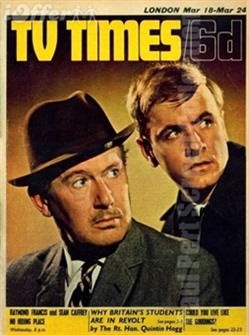Production
Murder Bag comprised 55 half-hour episodes: 30 in Season One (16 September 1957 – 31 March 1958), all untitled (being identified only by case number, as "Murder Bag – Case One", etc); [3] and 25 in Season Two (30 June 1958 – 1 April 1959), all titled, and featuring the word "Lockhart" as the first word of their title. Murder Bag was created by Glyn Davies, produced by Barry Baker and written by Barry Baker and Peter Ling. [3] Backup sergeants and others changed regularly. The murder bag in the title carried 42 items which were needed in the investigation of a crime. The show was produced live in the studio. According to IMDb there were 29 episodes in series one and 40 in series two.
In Crime Sheet, Lockhart had now been promoted to Detective Chief Superintendent. [4] The writers of the series revealed to the TV Times in 1962 that Lockhart could not be promoted above this rank, as he would no longer be expected to visit the crime scene, thus hindering the potential of the storylines. 17 episodes (23 episodes according to IMDb) of 30 minutes were produced from 8 April 1959 to 9 September 1959. Due to Raymond Francis contracting mumps, the final episode of Crime Sheet did not feature Lockhart but Chief Superintendent Carr, played by Gerald Case.
No Hiding Place continued to follow the cases of Detective Chief Superintendent Tom Lockhart at Scotland Yard, with a new longer one-hour format allowing for more story and character development. He was initially assisted by Detective Sergeant later Inspector Harry Baxter (Eric Lander), followed by Det. Sgt. Russell (Johnny Briggs) and Det. Sgt. Perryman (Michael McStay), and finally by Det. Sgt. Gregg (Sean Caffrey).
Crossover episode - One 1962 episode, broadcast on 25 September, series 4, episode 21, The Most Beautiful Room in the World, saw a guest appearance of Patrick Cargill in the guise of Top Secret [3] Miquel Garetta. [5]
Still largely studio-based, the series now included more pre-filmed sequences. A decision was made to cancel the series in 1965, but there were so many protests from the public and the police that it returned for another two years. [6] [2] 236 episodes were made in total. [7]
Detective Sergeant Harry Baxter was there from episode one until episode 141. Midway through the series he was transferred to E Division's Q Car Squad and promoted from Sergeant to Inspector, a rank he retained when he returned to the Yard in 1963. Baxter had his own short TV series, Echo Four-Two. Unfortunately the show suffered from poor scripts and of 13 planned episodes, only 10 were made (30 minutes each, 24 August 1961 to 25 October 1961), interrupted by an actor's strike, and no more were made.
The No Hiding Place theme music, was performed by Ken Mackintosh and his orchestra, entered the charts in 1960.
This page is based on this
Wikipedia article Text is available under the
CC BY-SA 4.0 license; additional terms may apply.
Images, videos and audio are available under their respective licenses.
